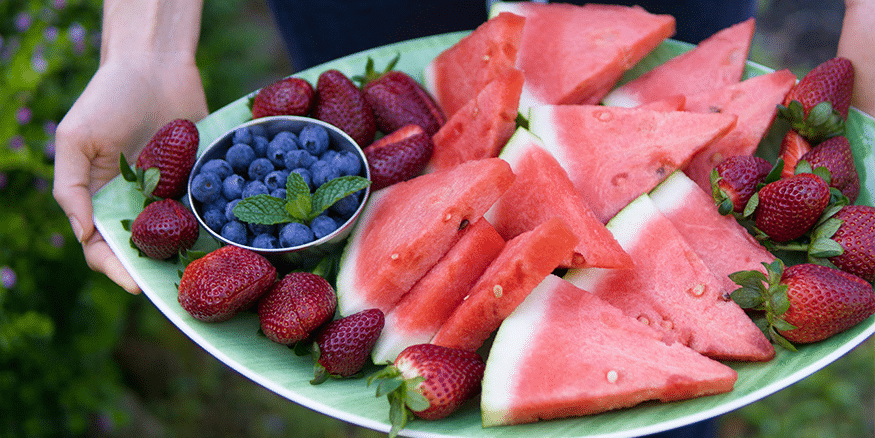
A Traditional Chinese Medicine Look at Summer Foods
Have you ever thought about looking at foods from a different perspective? Traditional Chinese Medicine (TCM) was founded on centuries of observing nature and the human body’s reactions to trying different things, which is the very essence of science. TCM emphasizes the consumption of local, seasonally available foods for better health.
Grocery stores abound with foods from every corner of the world – goji berries from the Himalayas, papayas from Belize, coconuts from the Philippines, avocados from Mexico, and so forth. These foods are all healthy produce that I often recommend to my patients for various reasons but, from a TCM perspective, imports should not comprise the bulk of your diet. One reason is that farmers have to harvest them before they are ripe, to allow time for packaging, shipping, and shelving. If you have ever travelled to a country where you can try a tree-ripened, fresh, local banana, then you know that there is a world of difference in taste when compared to one bought from your local grocer.
TCM also believes that Mother Nature has provided the right kind of food for the right kind of environment. If the weather is cold, then warming and nutrient-dense root vegetables are best. Hot weather that makes you sweat calls for cooling and water-filled cantaloupe, watermelon, and cucumber. If you live in an area that is too cold for the year-round growth of vegetables, you’re not off the hook; you will need to eat some imports.
Abundance of fruits and vegetables is not usually an issue in the summer in most places. Perhaps that is one reason why summertime is such a popular season. You get to eat more berries and cherries, beans and broccoli, peaches and peppers, tomatoes and potatoes, and the most summery food of all – watermelon.
Summer in Canada also brings warmer – sometimes sweltering hot – weather that makes many of us crave icy cold food and drinks. I’m sorry to say it, but TCM is particularly opposed to ice cream. Knowing that favourite foods are hard to give up, TCM offers some healthier substitutions for ice cream, such as frozen slices of peaches, frozen grapes, and healthy homemade fruit shakes. As always, it is important to pay attention to how you feel when you eat certain foods. Maybe a small amount of coconut ice cream makes you feel happy and your body can handle the occasional treat, so enjoy.
On the other hand, maybe eating too many raw and cold foods causes you to feel cold, sluggish, and bloated. If this is the case, you may need to continue to ingest a balance of warm foods even when the outside temperature climbs. For example, try adding sliced ginger or some warming cinnamon to your cold fruit shake. Keep steaming your vegetables and continue to have soup. Miso soup is easy to make and is a nice balance of cooling foods (miso, tofu, seaweeds) with a warm temperature.
If you are unsure which foods are warming and which are cooling, think of how you feel when you eat them. Peppermint is cooling; cayenne is heating. Think as well of the colour of the food. Green and blue foods tend to be more cooling, while orange, red, and yellow foods are generally more warming. Foods that grow below the ground are inclined toward warming the body, while those growing above tend to cool us off; however, these are guidelines, not hard rules.
If you are not sure what foods are seasonally available where you live, try visiting a local farmer’s market or check out www.eatwellguide.org. You can also ask your local Traditional Chinese Medicine doctor for some advice on foods that best fit your personal profile. To cool down this season, the TCM summer food diet might be just what you need!

